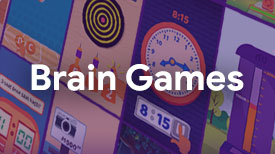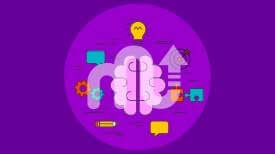Attention Deficit Hyperactivity Disorder / ADHD Overview
Attention deficit hyperactivity disorder (ADHD or ADD) is an important issue that parents are becoming more curious about each day as it becomes increasingly common. According to the American Psychiatric Association, 8.4% of children in the U.S. have ADHD.
.jpg)
As it became widely known, lots of parents started to think that their children may have an attention deficit disorder without knowing exactly “What ADHD is?”. The main point is that it causes learning difficulties and various problems in children and may affect their future success.
8.4% of children in the U.S. have Attention deficit hyperactivity disorder. Learn about ADHD symptoms, ADHD tests, ADHD medication, and available ADHD treatment to support your kids!
Thus, in our article, we’ve gathered all the information about ADHD symptoms, ADHD tests suchs as MentalUP ADHD Test, ADHD medication, ADHD treatment, etc. to create a detailed and reliable resource for you.
Overview
Hyperactivity is one of the psychiatric problems which causes attention and focusing problems, as well as impulsivity. When it turns into a disorder, it can have huge negative effects on so many different areas in life.
ADHD is something a child is born with, and it escalates during childhood. According to the National Institute of Mental Health, ADHD symptoms begin as early as 3 years of age in some children.
However, different living conditions, psychological disorders, and the medical condition of the child can play an effective role in the formation and diagnosis of certain subtypes of ADHD.
According to the Centers for Disease Control and Prevention, there are 6.4 million diagnosed children only in the United States.
ADHD is a disorder that can cause learning difficulties, depending on the symptoms. To prevent the negative effects of the disorder and to boost attention, scientific brain games like MentalUP Attention Exercises can be very beneficial.
What Are the Symptoms Of ADHD?
The symptoms of ADHD vary depending on the subtype of ADHD. We can list ADHD symptoms in kids and adults according to the subtypes of ADHD as follows:
1- Inattentive ADHD Symptoms
- Procrastination
- Inattention
- Hesitation
- Forgetfulness
2- Hyperactive-Impulsive ADHD Symptoms
- Difficulty controlling behavior
- Having problems in paying attention
- Excessive activity
3- Hyperactive-Impulsive ADHD Symptoms
- Hyperactivity
- Inattentive
- Impulsive
What Causes ADHD?
The exact ADHD causes are not known yet. However, according to research, ADHD does not appear due to biological causes originating from the brain.
On the other hand, environmental and genetic factors are argued to be highly effective on brain functions and development, and hence on ADHD. Here are some examples of the possible causes of ADHD:
- Brain damage
- Neurophysiology
- Post childhood traumatic stress disorder
- Lack of early attachment
- Drug use during pregnancy
- Sleep Apnoea
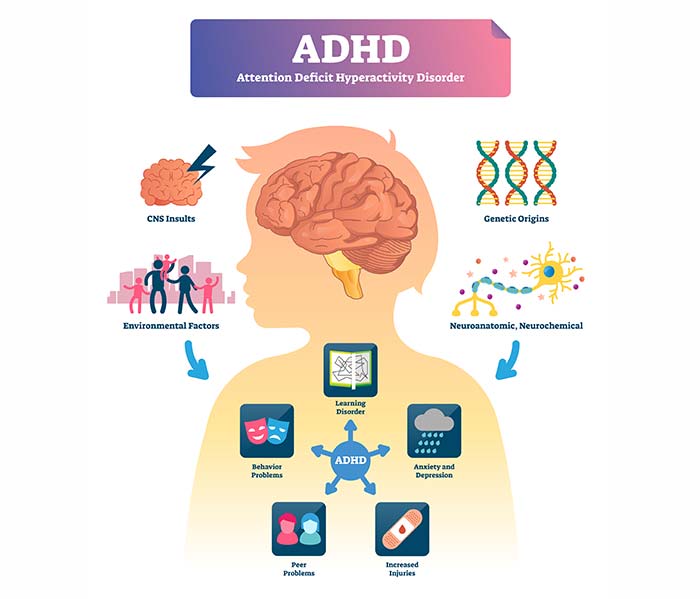
Risk Factors For ADHD
Risk factors increase your chances of developing a disease or condition. The more risk factors coexist, the higher the chance of getting the disease.
Below we list the risk factors that trigger ADHD:
- Gender: ADHD in girls is less common than in boys.
- Heredity: The risk increases if there is ADHD in the family and especially in twins.
- Age: Generally, the risk is higher between the ages of 3-6.
- Maternal Factors: High blood pressure, smoking during pregnancy, mental health conditions increase the risk.
- Toxins: Being exposed to polychlorinated biphenyls (PCBs), lead or pesticides may higher the risk.
- Premature Birth: If the baby is born before the start of the 37th week of pregnancy.
- Head Injuries: Especially brain injuries at a young age affects risk.
- Heart Conditions: Being born with a serious heart condition is risky too.
- Turner Syndrome: Genetic conditions like Turner Syndrome increases the risk.
With MentalUP Attention Exercises, it is possible to increase your kids’ attention period with 15-minute daily fun exercises. You can start the attention exercises now with MentalUP’s scientific games designed by academicians and professional game designers:
Train Your Attention
Complications for Children
If a child with ADHD is not treated with adequate ADHD treatment, this may lead to development of certain emotional and physical complications in the child such as:
- Learning Disabilities
- Depression
- Poor self-esteem
- Anxiety
- Sleeping problems/disorders
- Bed-wetting
- Bipolar Disorder
- Trouble building relationship with peers
- Social difficulties
- Oppositional defiant disorder (ODD)
- Accidents and injuries
- Substance abuse
- Delinquent or risky behavior
- Excess weight and eating disorders
How Is ADHD Diagnosed?
There is no blood test to diagnose any kind of ADHD. So how to get diagnosed with ADHD?
ADHD diagnosis can only be made by a doctor with certain steps by looking at many different variables in the child's life. Psychologists and psychiatrists observe certain common personality or behavioral problems as the signs of ADHD to diagnose and decide on the treatment of ADHD.
Below we’ve listed some of these problems observed commonly in people with different subtypes of ADHD.
1- Inattentive - Signs of ADHD
- Avoiding tasks that require thought and long-term focus
- Tendency not to pay attention or make careless mistakes
- Difficulties with focus
- Intense discontent
- Not listening when being talked to
- Challenges in time management and task organization
- Losing important items or accessories frequently
- Distracted easily
- Difficulties in following instructions
- Forgetting to complete tasks and fulfill obligations
2- Hyperactive-Impulsive - Signs of ADHD
- To look like "on the move" all the time
- Not being able to sit still
- Inappropriate and timeless running or climbing
- Interrupting the other person all the time during a chat
- Always block others in events or games
- Permanent fidgeting, touching or curling hands and feet
- Speaking excessively
- Very noisy when playing games
- Reluctance to wait for their turn
3- Predominantly Combined - Signs of ADHD
A person with combined ADHD shows characteristics from both Inattentive and Hyperactive-Impulsive ADHD.
ADHD Test: Does my kid have it?
Even if your kid is showing some of the symptoms of ADHD mentioned above, they may not be suffering from the disorder. For this reason, you should definitely consult a doctor before making any certain decisions and starting ADHD treatment.
A test that fully diagnoses ADHD is also not available. However, ADHD tests designed by doctors may give you an idea if your kid shows the symptoms.
Here you can find MentalUP’s scientific ADHD test
If this is not enough for you, you can also benefit from our scientifically approved selective attention exercises; double check your results and improve your skills by just spending 15 minutes a day.
When to see a doctor
If you think your child is showing symptoms of ADHD, you can consult your pediatrician or family doctor. Your doctor may refer you to a developmental-behavioral pediatrician, psychologist, psychiatrist or pediatric neurologist.

How to Treat ADHD In Children?
It is not possible to treat ADHD using a single method. Doctors will take advantage of several different therapy methods, including medication, according to your child's subtype of ADHD.
Let's take a look at ADHD medications and other methods that are used for ADHD treatment:
Treatment with medication
ADHD meds can be prescribed by the doctor to increase attention and focus. The most commonly used drugs for this are the stimulants listed below:
- Adderall
- Focal's
- Vyve France
- Concerta
- Ritalin
Non-stimulating drugs are also used for ADHD treatment. These include Strattera and clonidine (Catapres). A doctor usually prescribes the lowest dose and increases if necessary.
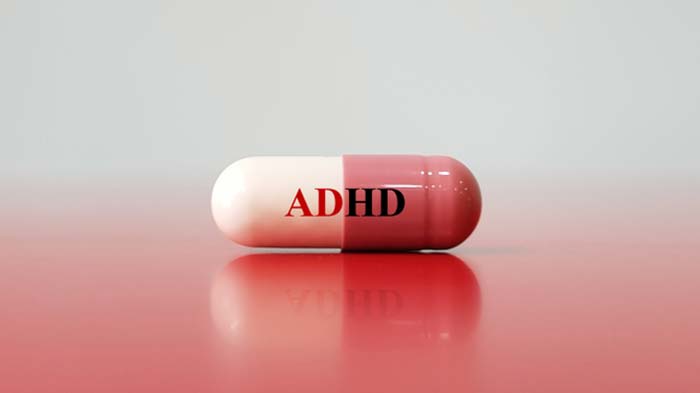
Can you treat it without drugs?
Yes, you can treat ADHD without medication for ADHD. But keep in mind that ADHD is not a 100% treatable disorder. Although the drug speeds up the treatment, doctors can reduce ADHD symptoms by using many drug-free ADHD treatment methods. Some of these methods are:
- Education therapy
- Psychological therapy
- Behavioral therapy
- Family therapy
- School support
- Parent coaching
- ADHD apps
What Are the Ways of Preventing My Kids from Getting ADHD?
In fact, there is no complete way to avoid ADHD. However, there are methods you can use to minimize the risk of getting it.
Here is a list of some of them:
- Prepare a quiet environment for your child to do their homework
- Stay in communication with your child and observe behavioral changes
- Have your child start the day with a protein-rich breakfast
- Let your child walk for at least 20 minutes a day to increase focus
- Set age-appropriate rules and make sure they follow them
- Be positive, stay calm and be the best role model for them
- Take care of your marriage for a regular family life
- Stay in touch with class teachers at school
- Limit screen time. Spending more than two hours in front of a screen can have negative effects.
MentalUP supports cognitive development with 15-minute personalized brain exercises that boost attention and focus. ⏰
It also offers fitness activities that allow children to keep their bodies active as well as their minds. 💪🏃♂️
You can track your children’s improvement with the performance tracking feature. 📊
These are some of the most beneficial features that make schools and more than 10+ million individual users prefer MentalUP.
Tips to Support a Kid With ADHD
Living with an ADHD child or adult can be quite challenging. Especially children with ADHD should be guided most accurately by their parents. For this reason, we have prepared our “4 Tips for People Living with ADHD - How to manage it” blog content for you.
Here are some suggestions you can use to help children with ADHD:
- Learn all ADHD symptoms and ADHD treatment options
- Improve your parental skills
- Support ADHD treatment options with behavioral interventions
- Support ADHD treatment with technology
Other Facts On ADHD
While giving an overview of ADHD, it is useful to examine a few important information. The first is the Prevalence of ADHD, and the other is ADHD Comorbidity.
- Prevalence of ADHD According to the parent-report data from the National Survey of Children’s Health (NSCH);
- The prevalence of children ever diagnosed with ADHD increased by 42% between 2003 (7.8%) and 2011 (11.0%).
- Males had a consistently higher prevalence of ADHD than females from 2003 to 2011.
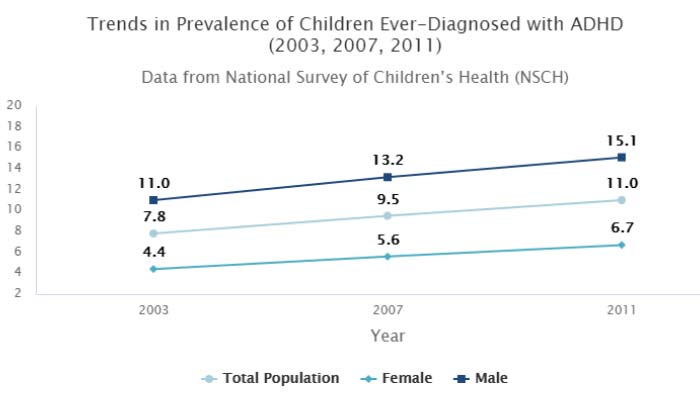
- ADHD Comorbidity
Comorbidity is the medical term for two or more disorders that occur simultaneously.
This situation is frequently experienced in people with ADHD. In individuals with ADHD, often other behavioral disorders that affect their vital functions are also observed. ADHD Comorbidity with other disorders is between 60% and 80%.
It is also difficult to diagnose ADHD in people who have comorbidity. This is because ADHD symptoms and other disorder symptoms such as autism intertwine. This situation can make diagnosis difficult, as well as disrupt the treatment process.
If you already know that your kids’ ADHD disorder intertwines with autism, it can be helpful for you to check out the best autism apps for kids. But if that’s not the case, you can look at the list below to find some diseases that occur together with ADHD:
- Oppositional Defiant Disorder
- Depression
- Anxiety
- Bipolar disorder
- Conduct Disorder
- Sensory Integration Disorder
- Learning Disorder
- Early Speech / Communication problems
It is the first step to raise awareness and increase your knowledge to learn how to diagnose ADHD by understanding the symptoms of ADHD and to support your child in order to undergo the necessary ADHD treatment.
To learn more about Attention Deficit Hyperactivity Disorder, you can check the MentalUP’s content about ADHD questions and benefit from MentalUP’s scientific attention and focusing exercises designed by academicians and doctors to lower ADHD symptoms and support ADHD treatment.


